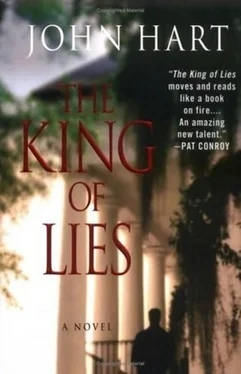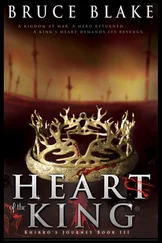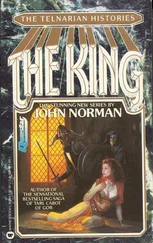“Then let’s get on with this.” She began systematically, and I had to admit that she was good. She established my identity, my relationship to the deceased, and my occupation with minimum dialogue. She wanted a clean, crisp transcript. She questioned me about the night my father died, and she was thorough. She wanted every moment accounted for, and I gave her the same story I’d given before. Mother’s accident. The hospital. Ezra’s house. The phone call. His sudden departure. I played down the severity of his argument with Jean, and I confirmed once again that after I’d left Ezra’s house, I was at home for the rest of the night. “No,” I told her. “I never saw my father again.”
“What about his gun?” she asked.
“What about it?”
“Did you know where he kept it?”
“Lots of people did.”
“That doesn’t answer my question.”
“I knew where he kept it.”
“Do you know how to fire a gun?”
“You point and you pull the trigger. It’s not rocket science.”
“Do you know where it is now?”
“No,” I told her. “I have no idea.”
So she went back to the beginning. She went over every detail again and yet again. She approached my story from different angles, searching for inconsistencies, the tiny lies that every guilty person tells. “What time did you go to bed? How about your wife? What did you talk about? Tell me about the argument. Tell me what happened at the hospital. What else did your father say before he left? How about the phone call? Let’s go over that again.”
On and on, for hours. “How did you get along with your father? What was your financial arrangement in regards to the practice? Were you partners or were you an employee? Did you have a key to his house? Did he lock his office at night? How about his desk?”
I asked for water and Mills poured a glass from the pitcher. I took a small sip.
“When did you first learn about the will?”
“I knew he was leaving me the house, but I knew nothing else about it until I met with Hambly.”
“Your father never discussed it?”
“He was a secretive man, especially about money.”
“Hambly tells me you were angry about the terms of the will. He says you cursed your father’s name.”
“Jean was not included.”
“And that bothered you.”
“I think it’s cruel.”
“Let’s talk about your mother,” Mills said. I stiffened.
“What about her?”
“Did you love her?”
“What kind of question is that?”
“Answer the question, please.”
“Of course I loved her.”
“What about your father?”
“He loved her, too.”
“That’s not what I meant.”
“He was my father.”
“That doesn’t answer the question,” she said.
“I think it does.”
She leaned back in her chair, enjoying this power she had over me. “Were you friends?”
I thought about it, and almost lied. I wasn’t sure why the truth came out, but it did. “He was my father and my business partner. We were not friends.”
“Why not?”
“He was a hard man. I don’t think he had many friends.”
Mills flipped the pages of her pad, looking back over some previous notes. “The night your mother died.”
“That was an accident,” I said, a little too loudly.
Mills looked up, the pages still held between her fingers. “So you’ve said. But questions were asked. There was an inquest.”
“Haven’t you read the report?” I asked.
“I’ve read it. It raised some questions.”
I shrugged as if this wasn’t killing me. “People die. Questions are asked. That’s how it’s done.”
“Where was Alex Shiften?” she asked.
The question took me off guard. “Alex?”
“Yes. During the argument. After the argument. Where was she?”
“I don’t know,” I told her truthfully.
Mills made a note on her pad and then changed tack seamlessly. “You’ve never seen your father’s will. Is that right?”
She’d asked this before. “I’ve never seen his will,” I told her. “I never knew any details. Until I spoke with Clarence Hambly, I had no idea that his estate was so large.” I sensed movement and looked at Detective Small Head. He hadn’t actually moved, but the razor’s edge of his mouth had turned up at one corner, and suddenly I felt the true danger of the game I was playing. I couldn’t see Mills’s trap, but I sensed it. My next words were spoken slowly. “I certainly didn’t know that he’d left me fifteen million dollars.”
I put my eyes back on Detective Mills and saw the first gleam of triumph. Whatever she had up her sleeve, I was about to find out. She opened the manila folder and removed what looked like a document sealed in a clear plastic evidence bag. She read the evidence number into the record, took the document out, and then laid it before me. I knew what it was before it hit the table. A glance confirmed my suspicions. “The Last Will and Testament of Ezra Pickens,” it read.
“You’ve never seen this document?” she asked.
“No,” I said, a hollow place opening in my stomach. “I’ve never seen it.”
“But according to the title of this document, it is your father’s will. Is that a fair statement?”
“It purports to be the last will and testament of my father, yes. You’d need Clarence Hambly to confirm it.”
“He has,” Mills said, making her less-than-subtle point. Everything would be confirmed. Every word I said. “And you’ve never seen it before?”
“No.”
“No, you’ve not seen it?”
“That’s correct.”
Mills picked up the document.
“I am turning to page five,” Mills said. “There is a sentence here that has been marked with a yellow Hi-Liter. The last three words of that sentence have been underlined three times in red ink. I’m going to show this to you and ask you if you have ever seen this.”
She presented the document, placing it face up on the table. The feeling of surreal calm that had enveloped me started to crumble.
“I have never seen this before,” I said.
“Will you please read the highlighted portion?”
I felt Detective Small Head detach himself from the wall. He crossed the room and stood behind Mills. In a shallow voice I read my father’s words; it was a voice from the grave, and it damned me.
“To my son, Jackson Workman Pickens, I leave, in trust, the sum of fifteen million dollars.” Red ink underscored the dollar figure. Whoever did it had pressed down hard, as if in anger or expectation. I could not bring myself to look up. I knew what the next question would be. It came from Mills.
“Will you explain for us how this document, which you have never seen, came to be in your house?”
I could not answer them. I could barely breathe. My father’s will had been found in my house.
They had their motive.
Suddenly, a hand crashed down on the table before my eyes. I jumped in my chair, looked up at Mills. “Damn it, Pickens! Answer the question. What was this doing in your house?”
Mills continued, pounding me with words as she’d pounded the table with her open palm.
“You knew about the will,” she said. “You needed the money, and you killed him!”
“No,” I finally said. “None of that is true.”
“Hambly told us that your father planned to change the will. He was cutting you out, Pickens. Fifteen million dollars was about to fly out the window, and you freaked. So you put two in his head and you waited for the body to be found. That’s how it happened, isn’t it? Admit it!”
I was stunned. He was going to cut me out? Hambly had never mentioned that. I filed the issue away, concentrated on the present. This was a hard blow, a strategic nightmare, but I’d faced worse. I had to think. I had to be calm. I took a slow, deep breath, told myself to think about the transcript of this interview, think about a future jury. This was a deposition, I told myself. Nothing more.
Читать дальше












